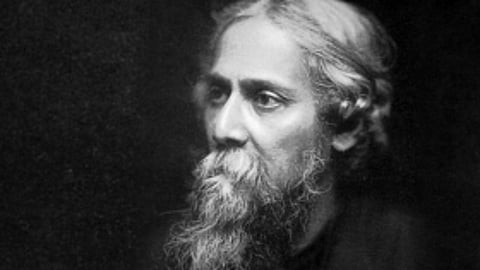'Kobiguru' Rabindranath Tagore will always 'robe nirobe' in our hearts through his art
Born on May 7, 1861, 'Kobiguru' Rabindranath Tagore is one of the most celebrated literary figures all around the globe.
An enigmatic author, people's poet, painter and a dramatist like no other- Kobiguru has contributed profoundly to the Bengali canon and his work, expansive as they are, remains relevant even today.
His works are what shaped my childhood back in Kolkata, beginning my assembly with his songs to ending my day on the note of his prose, Rabindranath has been deeply embedded in our Kolkata lives!
He was the first non-European to receive a Nobel Prize for Literature in 1913 because he wrote Gitanjali, a collection of 157 poems, that was published in 1910. Kobiguru was also granted Knighthood in 1915 but in 1919, after the Jallianwala Bagh massacre, he renounced it.
Rabindranath Tagore is often remembered for his poetic songs, which are both spiritual and mercurial. One of those great minds ahead of his time, Gurudeb is an intrinsic part of our Bangali lives back home.
His meeting with Albert Einstein is considered as a clash between science and spirituality even till date because of the histories of both the heroes, excelling in their own discipline.
Other than building his legacy, he brought about many changes in the society, for the greater good. While managing his dreams of setting up Visva Bharti University in Shantiniketan, he came closer to humanity and explored his interest in social reforms.
In his literary life and in the personal, Rabindranath Tagore did undergo brief phases of social and cultural conservatism. His work represented the progressive face of relationships that was to develop in modern Bengal. For Tagore, importantly, human love was but a metaphor for the love of the divine and that helped him to poetically express and enhance the sense of equity and social justice between the sexes too.
If you want to gain more insights into his works, you should watch movies like Charulata, Ghare-Baire, Teen Kanya, Chokher Bali, which were initially his stories which were later delivered on-screen by skilled directors, who created history through these masterpieces.
"Hridoye momo, tumi robe nirobe..."
To get all the latest content, download our mobile application. Available for both iOS & Android devices.

